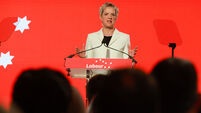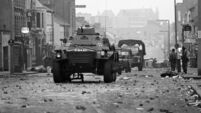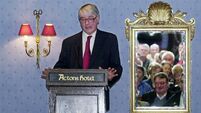Emma deSouza: Focus on the North's politicians misguided, the real work happens on the ground

Betty Williams (left) and Mairead Corrigan blowing whistles at a Peace Rally in Belfast in 1977. File picture: Alan Lewis, Photopress Belfast
As the ramp-up to the 25th anniversary of the Belfast/Good Friday Agreement reaches a fever pitch, focus appears fixed on the politics, with former architects, presidents past and present, and politicians across these islands in the spotlight.
But the agreement needed more than politics to reach fruition; It required people, and key to the resounding “yes” in 1998, and the sustained peace thereafter, has been civic society.
















